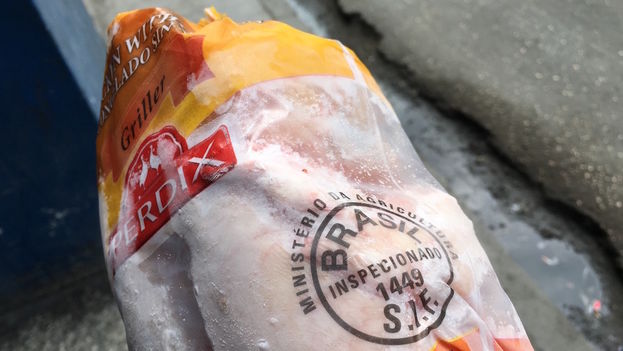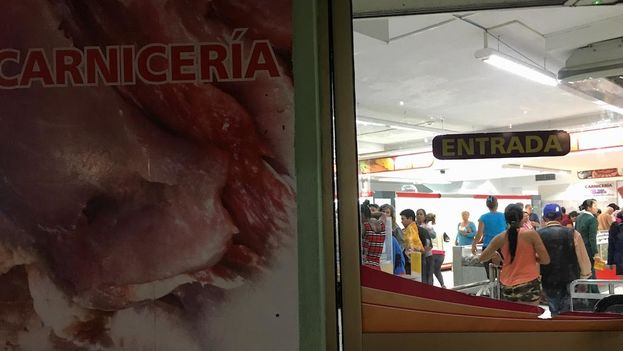
![]() 14ymedio, Zunilda Mata, Havana, 21 March 2017 — Cubans know a lot about adulterations. For decades they have grappled with the “diversion of resources” [i.e. stealing] from state stores and the practice of state employees acquiring products elsewhere at low prices, bringing them into the stores and selling them at high prices and keeping the profit for themselves. Hence the scandal of the altered meat that involves two Brazilian companies has hardly surprised anyone on the Island.
14ymedio, Zunilda Mata, Havana, 21 March 2017 — Cubans know a lot about adulterations. For decades they have grappled with the “diversion of resources” [i.e. stealing] from state stores and the practice of state employees acquiring products elsewhere at low prices, bringing them into the stores and selling them at high prices and keeping the profit for themselves. Hence the scandal of the altered meat that involves two Brazilian companies has hardly surprised anyone on the Island.
This Monday Brazilian meat products continued to be sold in Cuba’s retail network, where the frozen chicken of the brands Frangosul and Perdix, from the companies JBS and BRF respectively, continue to be on sale. According to an investigation by the Federal Police of Brazil, both these companies adulterated these products.
In the case of chicken, the authorities have warned that it is more of an economic fraud, consisting of adding water to the product to increase the weight, without any risks to health.
In the case of chicken, the authorities have warned that it is more of an economic fraud, consisting of adding water to the product to increase the weight, without any risks to health
The results of what was called “Carne Fraca” (“weak meat” in Portuguese), confirmed the suspicions of those who warned that something “doesn’t smell right” in the world’s largest exporter of these products. Each year Brazil exports beef worth roughly 5.5 billion dollars and chicken worth roughly 6.5 billion. This business represents 7.2% of Brazil’s Gross Domestic Product.
So far, no Cuban store or market has withdrawn the Brazilian frozen food products. On the digital sites that offer a wide range of foods that emigrants abroad can order for their families on the island, Brazilian beef and chicken remain on sale.
The official media spread the news of the scandal, focusing on the possible repercussions for President Michel Temer’s government. The Ministry of Public Health did not discuss the issue when asked by 14ymedio.
Cuba imports more than 80% of the food it consumes. For 2017, the bill for these purchases is expected to exceed $1.75 billion, $82 million more than the estimate for the previous year.
Each year, more than 120,000 tonnes of chicken meat are bought in the international market, most of it hindquarters, also called “dark parts.” Alberto Ramírez, president of the Cuban Society of Poultry Producers (SOCPA), recently confirmed to the official press that “[domestic] meat production is practically zero.”
Each year more than 120,000 tonnes of chicken meat are bought in the international market, most of it hindquarters
In 2014, several representatives of the Ministry of Agriculture visited Brazil to inspect the facilities of the dairy and beef plant managed by JBS in Mato Grosso do Sul, with a view to importing its products to the Island. Another 25 facilities approved for trade with Cuba are located in the states of Tocantins, Rondonia, Rio de Janeiro, Rio Grande do Sul, Goiás, Mato Grosso and Sao Paulo
The United States and Brazil are the countries supplying the greatest amount of frozen products to the Cuban market. Faced with the lack of supply and the lack of variety, chicken has become one of the most common foods at the table of Cubans. Only the wealthy can afford beef.
“I came to buy a piece of top round steak,” said a retired woman at the butcher’s in Plaza de Carlos III on Monday. She said, “it is a luxury that I can only allow myself from time to time.” The meat on offer in that market comes from Brazil, according to an employee who preferred anonymity, but who, so far, had received “no order to stop selling it.”
On display in the meat case are several packages with prime ground beef, stew meat, top round and tip steak. No merchandise specifies where it comes from, but local workers confirm that it has been bought from Brazil. The customers look longingly at the display; meat remains a forbidden delicacy for many, even if it is wrapped up in investigations and fraud.
“Here we work with Brazilian meat,” explains one of the waiters at the restaurant next to the Riviera cinema, formerly El Carmelo, on 23rd Street. In their menu they offer sirloin, fillet mignon, fried beef tender and ropa vieja (shredded beef in sauce), this last a very traditional dish that is in high demand among tourists.

The select El Palco market, whose main customers are diplomats and foreigners living in Havana, is also “especially stocked with Brazilian meat,” points out one of the local cashiers.
Some 27 people have been arrested in Brazil, and Federal Police Commissioner Mauricio Moscardi warned of a corruption network inside the government that allowed adulterated meat to be legalized. That chain of infractions involved officials of the Brazilian Democratic Movement Party, to which President Temer belongs.
The main Brazilian meat producers added chemicals to meats that were “rotten” or unfit for human consumption. An extensive network of bribe payments purchased approval from the Ministry of Agriculture.
“They used acids and other chemicals, in some cases carcinogenic, to disguise the physical characteristics of the rotten product and its smell,” Moscardi explained. They treated the meat with vitamin C to give it a more “appetizing” color, along with levels of preservatives well above those allowed by health authorities.
Representatives of both companies have denied allegations by police authorities, but the alarm has spread in the international market and the companies’ stock prices have tumbled sharply.
“BFR ensures the high quality and safety of its products and guarantees that there is no risk for its consumers,” said one of the largest food companies in the world with more than 30 brands in its portfolio, Sadia, Perdigão, Qualy, Paty, Dánica, Bocatti or Confidence.
Cuban customers who are learning about the news coming from Brazil are beginning to connect the dots. “The chicken no longer came with the quality of before and had a lot of ice”
The Chilean Ministry of Agriculture announced, a few hours ago, that it would accept no more imports from the Brazilian beef market. Minister Carlos Furche explained that the measure is temporary “until the Brazilian authorities know exactly what facilities are being investigated, and of those facilities which have exported to the world and Chile,” he said.
The Chinese authorities have responded unceremoniously. The Government banned all such imports and prevented meat already shipped from being unloaded in its ports. Last year the Asian country imported 1.6 billion dollars from Brazilian meatpackers.
Europe has slowed shipments from JBS and BRF. This week the European Commissioner for Health Affairs, Vytenis Andriukaitis, will travel to Brasilia and the agenda revolves around the food scandal.
Cuban customers who are learning about the news coming from Brazil are beginning to connect the dots. “The chicken no longer came with the quality of before and had a lot of ice,” complains Luisa Cordoves, a housewife in Central Havana who says that “right now it’s better to buy the chicken boxes that come from United States, because the product tastes better. ”
She believes that the scandal will not dissuade domestic consumers from acquiring these products. “People have many needs and there is no choice: you take it or leave it.”
